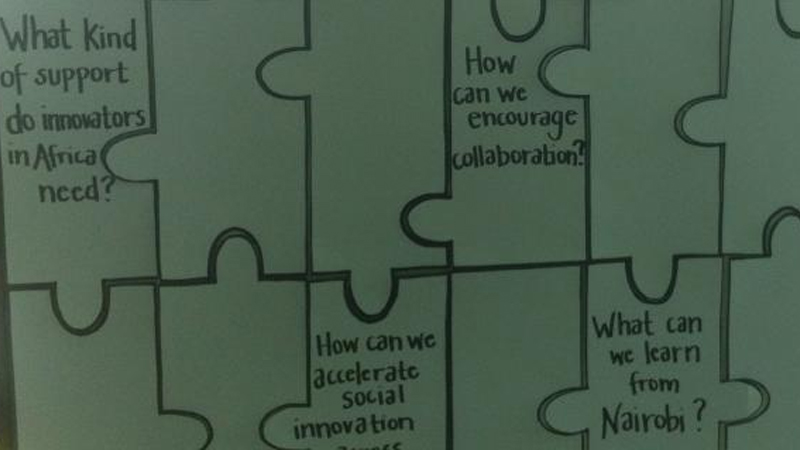Puzzle Pieces – What We Can Learn From Nairobi
June 18, 2015



What I learnt from the SIX event in Nairobi
This post was written by our intern Isabel McLain from Davidson College and originally published on SIX.
A little over 2 weeks ago, I left my home in the U.S. and arrived on Nairobi soil. I came here to spend about 2 months of my summer working for Amani Institute, which helps people create a career of meaning and impact through a variety of educational programs both for individuals and organizations, foundations and social enterprises. On my first day at the office, I was immediately thrown into the final preparations for a conference hosted by Amani Institute, Social Innovation Exchange (SIX), and Hivos around the theme “What makes a city a ‘hub’ for innovation? Learning from Nairobi.” Although it made for a fast-paced first week on the job, I am so glad that I got to be a part of this conference. My network practically exploded because I met so many interesting people. And you could say my brain exploded too with all the new information I absorbed. There couldn’t have been a better way to start off my time with Amani Institute.
Over the span of this conference, we asked multiple questions about “hubs” for innovation. I also began to ask myself multiple questions about my place in such “hubs.” Where do I plug in to the puzzle, the larger innovation ecosystem? As an undergraduate student at Davidson College in the U.S, I think its safe to say that I have time to answer that question. However, the conference showed me that everyone asks that question at times no matter how they initially answer it. To be honest, this scares me a bit. Will I ever know where I belong? Where do I fit in? Especially when it comes to social innovation work, I would like to know the answer. I would like to know what purpose and responsibilities I am supposed to fill. We are talking social justice and human rights. I need to change the world!

But then I remember how this conference all started: the FailFaire. This event created an open environment where innovators and innovators-in-training (like me) could share their failures, challenges, and the lessons learned as a result. The atmosphere was not only forgiving and liberating, but it brought me a little closer to reality. Success is not avoiding failure. Success is just trying over and over again to do your part. And it helps when your part is actually feasible. You don’t have to singlehandedly change the world. You could just have a small goal, and even if you fail at that, it’s okay! Get up and try again.
After the FailFaire, I was reminded of a quote by Jean Vanier, a well-known philosopher, theologian, and humanitarian. He once said, “But let us not put our sights too high. We do not have to be saviours of the world! We are simply human beings, enfolded in weakness and in hope, called together to change our world one heart at a time.” There is a sense of liberation that runs through me as I read those words. I recognize that I am just one piece in the puzzle. No one is asking me to be the whole puzzle. Because I know that I cannot do everything and that failure is not only inevitable but helpful, I am no longer frozen in fear and indecision. I am able to commit myself whole-heartedly to that one piece and make it the best that I can. I can also begin to see the unique ways that my work connects with others. And if this conference taught me anything, it is that connecting or collaborating is vital to the fulfillment of any social innovator.
